Green Management
The Department always accords high priority to environmental protection in all of its operations. We strictly comply with laws, regulations and standards for environmental protection, and strive to maintain best results and achieve further improvements. Correctional facilities are designed and operated in an environmentally friendly manner, while measures for resource conservation are implemented. Moreover, the Department is committed to waste reduction through recycling, green procurement, use of green products and eco-friendly materials, as well as raising the environmental awareness of staff and persons in custody, to ensure environmental protection.
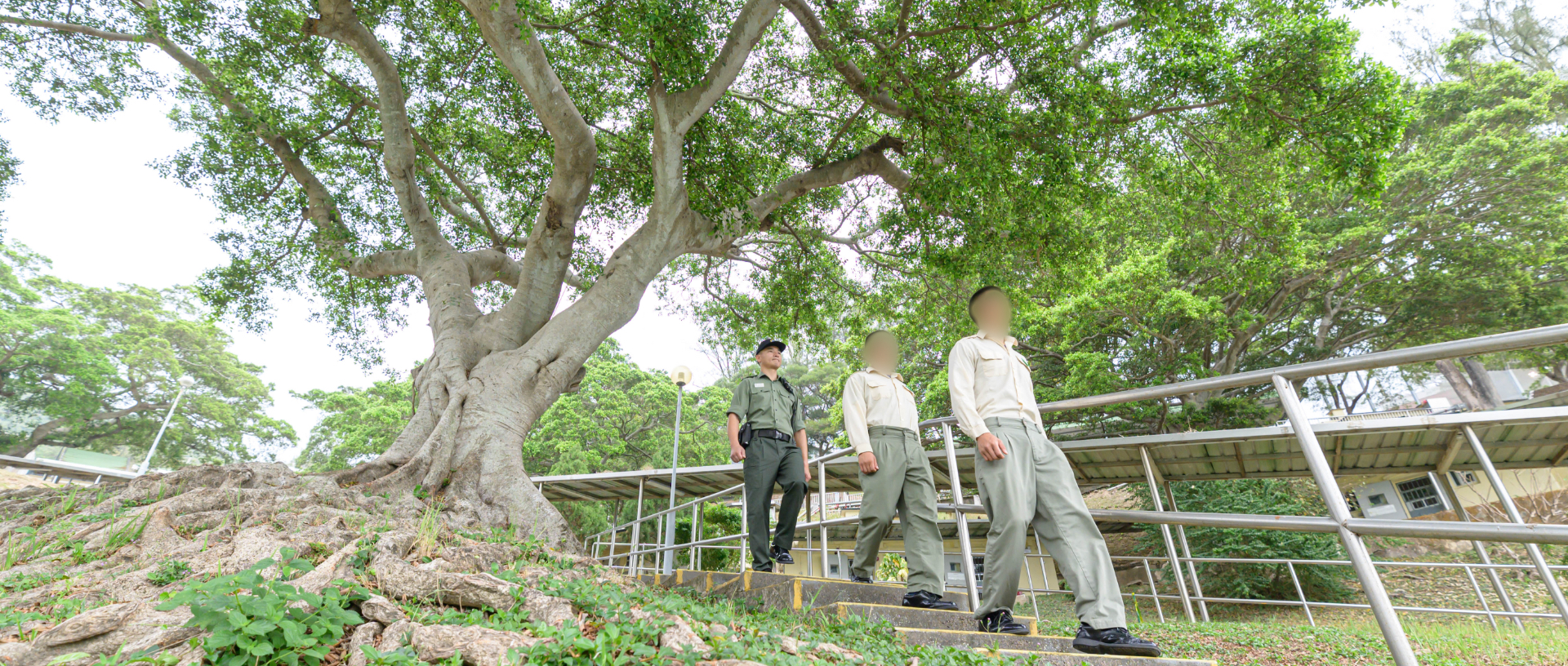
The Department takes timely actions to reduce the risks posed by the trees with potential problems through a systematic methodology and procedures, so as to enhance tree management and better protect the safety of people and property with trees nearby.
Environmental Management and Accountability
To facilitate the coordination of environmental work in the Department, the Green Manager’s Committee was formed in 1999, which sets environmental objectives and adopts measures in line with the Government’s environmental policies. The Environmental Auditing Team conducts comprehensive audits at institutions, and reports the findings and makes recommendations to the Committee. Such findings and recommendations will be provided to institutions for reference. Phoenix House and Siu Lam Psychiatric Centre were chosen for conducting comprehensive environmental audits in 2019.
Environmental Initiatives
Our environmental initiatives include energy conservation, use of renewable energy, green housekeeping and gradual replacement of conventional electrical appliances and lighting systems with energy saving models. In 2019, two projects for the replacement of aged floodlight systems with LED floodlights and nine projects for the replacement of split-type air conditioners with variable frequency drive types were completed.
The Department has been making its best endeavours in resource utilisation in order to limit wastage and control operational consumption in offices. In 2019, Pik Uk Laundry introduced phosphate-free detergents and started to replace three units of diesel-fired boilers with gas-fired ones. This not only helps protect the ecology but also reduces carbon emission by 14%. Besides, a new series of government office furniture will be fully launched in early 2020 and by then the consumption of wooden material will be reduced by 63%. Moreover, “Smart Laundry” posters are displayed in all laundry workshops of CSD to promote a water conservation culture. CSD conducted carbon audits for 20 correctional facilities from January 1 to December 31 in 2018. The average greenhouse gas emission from these correctional facilities during the period was 0.116 tonnes of carbon dioxide per square metre (Note 1).
The Department has been implementing water conservation measures. Institutional staff members regularly inspect the exposed parts of water pipes for signs of leakage and arrange timely repairs. To better educate staff and persons in custody, the Department has displayed posters and produced videos to promote the message of water conservation. The Department also regularly reviews the washing programme of its laundry workshops to enhance water efficiency. The Chief Executive has announced in her 2018 Policy Address a target of reducing the per capita fresh water consumption by 10% by 2030 at the earliest, using 2016 as the base year. As compared with 2016, the water consumption per capita of the Department was reduced by about 5% in 2018.
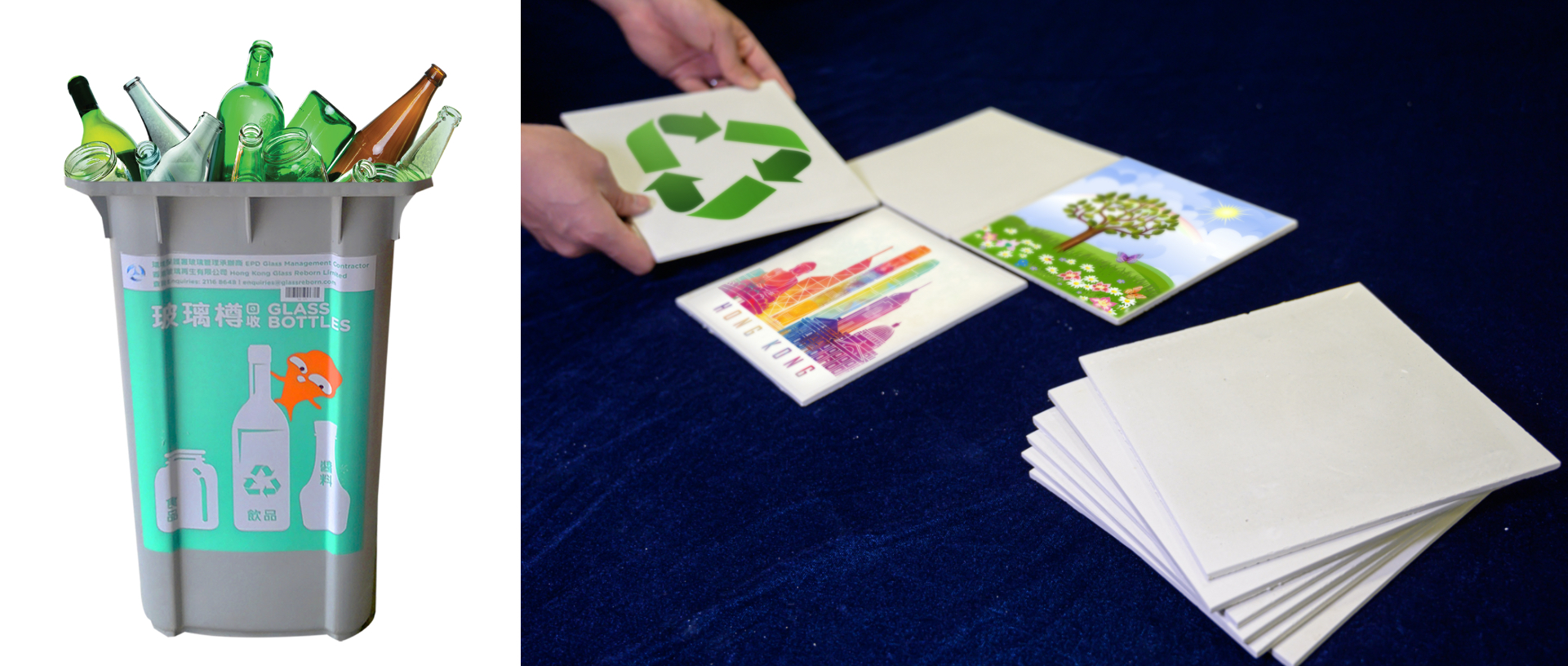
The Precast Concrete Workshop of Tai Lam Correctional Institution manufactures decorative wall tiles containing glass bottle aggregates provided by the Environmental Protection Department.
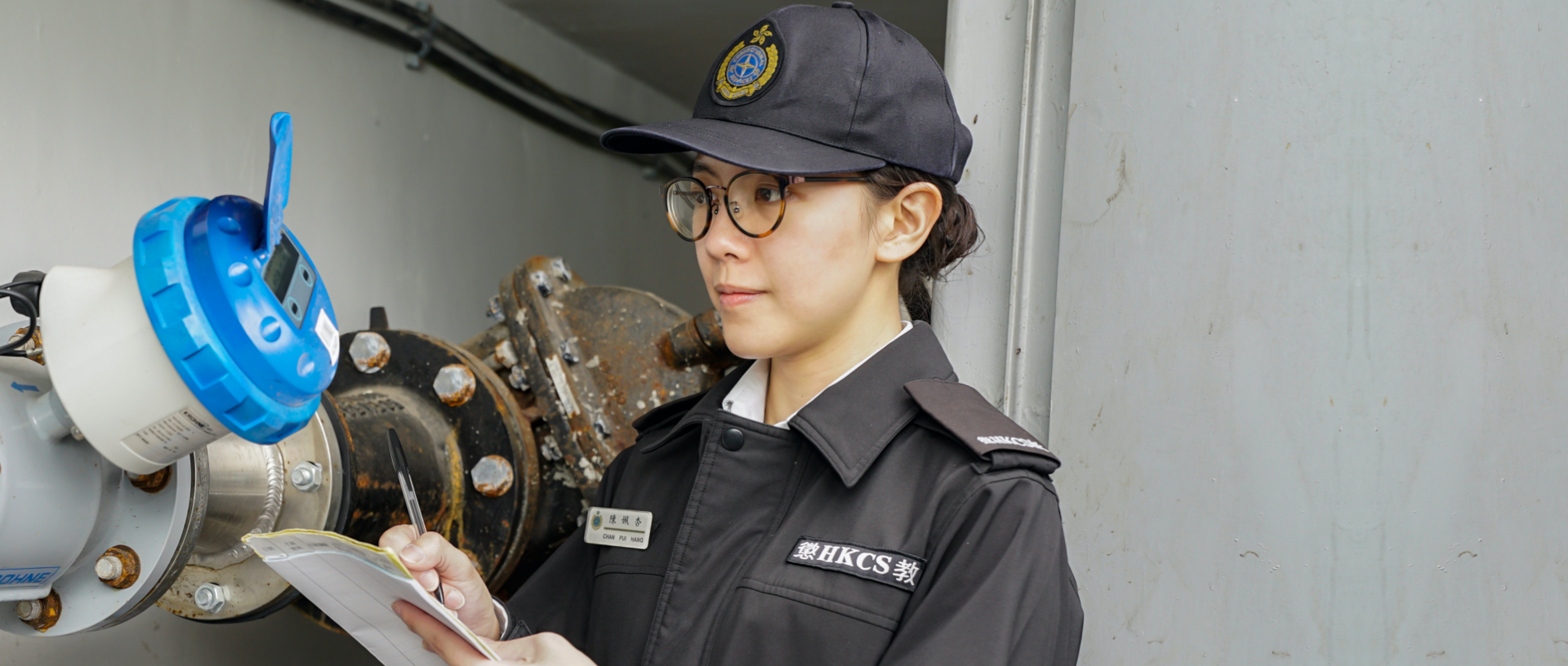
Correctional staff monitor the usage of water at institutions regularly.
In respect of food waste management, to further promote the message of food waste reduction among institutional staff and persons in custody, Food Wise Ambassadors have been appointed in correctional institutions since 2016. Moreover, persons in custody are encouraged to reduce the portion of their staple food including rice, chapatti and potatoes by joining the “Waste No Food” Scheme on a voluntary basis. The scheme is implemented in Lo Wu Correctional Institution, Nei Kwu Correctional Institution, Tai Lam Centre for Women and the Elderly Unit of Tai Lam Correctional Institution. In 2019, an estimated average of about 15,000 bowls of rice were saved each month. According to the latest survey carried out in 2019, the food-waste quantities of the 28 correctional institutions were at an average of 0.09 kg per person in custody per day, representing a reduction from 0.11 kg in August 2015. Food waste decomposing machines have also been introduced to Lo Wu Correctional Institution, Stanley Prison and Tai Lam Centre for Women for converting food waste into useful fertilisers for greening purposes.
Sewage treatment and filtration systems are regularly inspected and upgraded to prevent the discharge of polluted effluent and eliminate contamination sources. Noise control is another important task. Noise levels at all locations of institutions are monitored and where necessary, proper ear protectors will be provided, in particular in workshops. Regular indoor air quality assessments are also conducted to safeguard the health and well-being of all.
Note 1 : The relevant water consumption figures for 2018 were available in June 2019, and thus the respective carbon audit results are published in the Annual Review 2019.
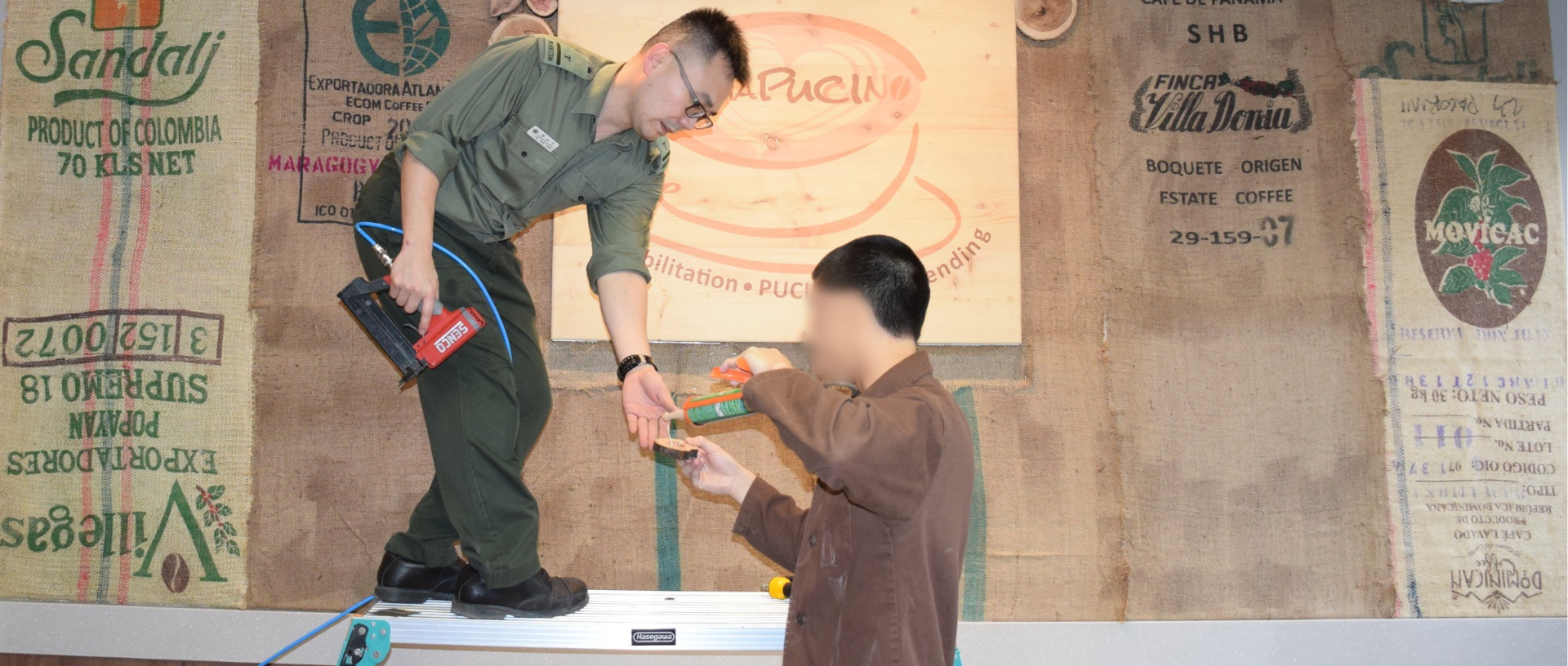
Salvaged wood is used for decorating the training restaurant Café Rehapuccino.
Green Collaboration
We has been working with the Architectural Services Department to repair water pipes and replace screw-down type water taps with self-closing taps in relevant institutions subject to the availability of resources. On energy conservation, the Chief Executive announced in his 2015 Policy Address a new target of achieving a 5% saving in electricity consumption for government buildings under comparable operating conditions between 2015-16 and 2019-20. The Department is working proactively with EMSD to meet the target by, for example, using more energy- efficient lighting facilities, air-conditioning systems and machineries, etc. As compared with 2013-14 under comparable operating conditions, the electricity consumption under the Department’s meter account was reduced by 12.02% in 2018-19. Besides the Precast Concrete Workshop of Tai Lam Correctional Institution has started to produce decorative recycled glass tiles containing glass bottle aggregates provided by the Environmental Protection Department to promote environmental protection and rehabilitation.
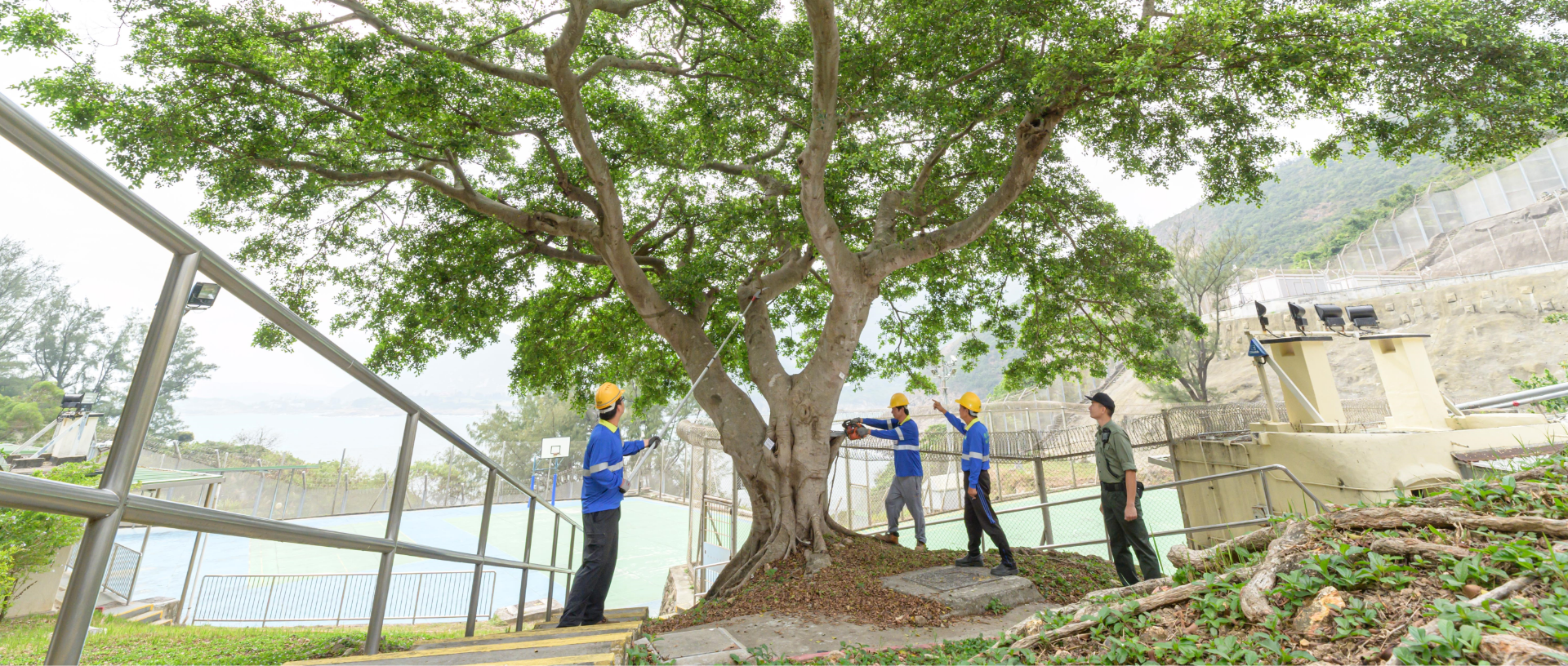
The Department takes timely actions to reduce the risks posed by the trees with potential problems through a systematic methodology and procedures.
Tree Management
To enhance tree management and better protect the safety of people and property with trees nearby, the Department will reduce the risks posed to the people and property by the trees with potential problems by taking timely actions through a systematic methodology and procedures, pursuant to the tree risk assessment arrangement introduced by the Tree Management Office.
Conservation Campaign
We engage suppliers with high environmental standards, and strive to educate correctional officers and persons in custody through conservation training and ecology-related classes.
